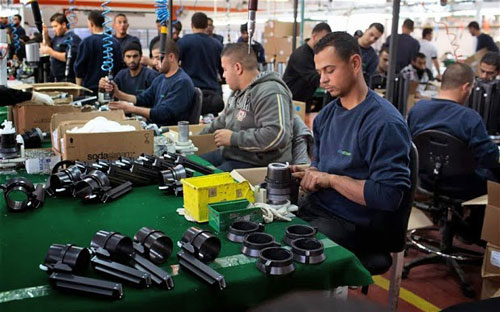Australia/Israel Review
Scribblings: Israeli Arabs for a Jewish State
May 27, 2014 | Tzvi Fleischer

Tzvi Fleischer
Extreme critics of Israel tend to argue that Israel’s existence as a Jewish homeland is inherently racist. Never mind that most countries in the world have some sort of ethnic identity associated with them – including almost all of Israel’s Arab neighbours – and that both Israel’s constitution and Israeli public opinion are very clear that the national goal is to both embody the Jewish people’s right to self-determination and be completely democratic, with absolutely equal rights for minority citizens.
Yet critics like Palestinian-American academic Dr. Joseph Massad, an intellectual leader of the anti-Israel Boycott, Divestment and Sanctions movement, write things like “The only thing Israel has asked for, and continues to ask for in order to end the state of war with the Palestinians… is that all recognise its right to be a racist state that discriminates by law against Palestinians and other Arabs and grants differential legal rights and privileges to its own Jewish citizens and to all other Jews anywhere.” Massad goes on to insist that “no resolution will ever be possible before Israel revokes all its racist laws and does away with all its racist symbols.”
But what do Israeli Arabs, the supposed main victims of the supposed terrible racism inherent in Israel’s identity as the nation-state of the Jewish people, think of this claim that “Jewish state” equals “racist state”. Not very much, according to the latest polls. A majority of them (52.8%) agree that Israel’s right to exist as a Jewish and democratic state should be recognised, according to the latest poll by Prof. Simcha Smooha of Haifa University. That’s up from 47.4% last year. Meanwhile, an even larger majority, 63.5%, agreed that the terribly “racist” State of Israel is a good place to live, up from 58.5% last year.
Of course, Massad and other BDS activists won’t be swayed by figures like these. They’ll likely argue that Israel has somehow co-opted or brainwashed the majority of its 1,694,000 Arab citizens. But when they make the claim that Israel’s identity as a “Jewish state” makes it inherently racist, it is worth keeping in mind that most of the supposed main victims of that “racist” identity don’t have a problem with it.
Geneva Revisited
When the Fourth Geneva Convention is cited in discussions of the Israeli-Palestinian conflict, the provision almost always talked about is Article 49, which, among other things, says an occupying power shall not “Deport or transfer parts of its own civilian population into the territory it occupies.” This is the key argument that is invoked to claim Israeli West Bank settlements are illegal, even though there are doubts both about this interpretation and the applicability of the clause to the West Bank.
However, in view of some recent arguments – not least from John Lyons on the ABC’s “Four Corners” – insisting that it is discriminatory, even a sign of supposed “apartheid”, that a different legal system applies for West Bank residents than for Israelis – it is worth looking at some other clauses of this Convention.
Article 64 says, “The penal laws of the occupied territory shall remain in force” and while the occupying power can amend the laws, this is only when “they constitute a threat to its security or an obstacle to the application of the present Convention.” Furthermore, under Article 66, if the occupying power arrests a resident of the territory for violating security related laws, it must try them via “properly constituted, non-political military courts… that… sit in the occupied country.” In other words, Israel is required by the oft-cited convention not only to refrain from applying the Israeli legal system, but also to try Palestinians in military courts – which explains why West Bank Palestinians are tried by such courts and Israelis are tried by civilian ones. This is not discrimination, much less “apartheid”. It is there in black and white as a requirement of the Fourth Geneva Convention in language much more unequivocal than Article 49 is on settlements.
Oh, and those who promote boycotts of companies like Sodastream, which operate factories in Israeli settlements employing Palestinian workers, might want to check out Article 39. This obliges the occupying power to grant “the opportunity to find paid employment” to residents who have lost their jobs. Israeli companies operating in settlements offer exactly this to Palestinian workers, thus arguably fulfilling Article 39.
Moreover, they do so under much better conditions than Palestinians usually get in the Palestinian sector, because Palestinians working for Israeli companies are required, under Israeli law, to be given the same terms and conditions as Israeli workers. Yet Article 51 says only that “the legislation in force in the occupied country concerning working conditions” should be applied to workers employed by the occupying power. This means Israel is exceeding its Geneva obligations, which do not oblige it to provide Palestinians working for Israeli companies the much higher wages and better benefits and conditions that Israeli workers get, but allows it to give them only the much lower pay and conditions of the Palestinian economy.
The truth is, claims about international law are often designed merely to provide one’s political goals with a patina of legal authority, and the aura of human rights. This is easy to do via the selective application and tendentious interpretation of the clauses of treaties and other legal instruments.
The Fourth Geneva Convention arguably does not apply, de jure, to the West Bank because it is not the recognised territory of any “high contracting party” (although Israel applies its humanitarian provisions voluntarily). But even if it does, Israel’s behaviour as the “occupying power” stacks up pretty well against the actual language of the Convention – as opposed to the politicised interpretations of it one often hears.
Tags: Israel






